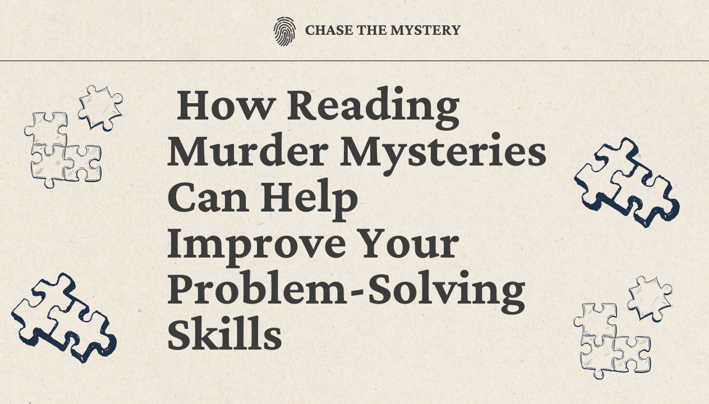Enhancing Problem-Solving Skills Through Reading Murder Mystery Books
Ever get hooked on a good murder mystery? Turns out, that page-turning obsession might actually be sharpening your brain. Murder mysteries aren’t just entertaining—they train you to think critically, spot details, and make connections. In this article, we break down how reading whodunits can boost your problem-solving skills. Whether you're solving crimes on the page or tackling real-life challenges, these mental muscles come in handy. Ready to see how your next mystery novel can double as brain training?
PERSONAL DEVELOPMENT
5/6/20254 min read
The Allure of Murder Mystery Books
Murder mystery books have an intrinsic allure that captivates readers from the very first page. The genre is renowned for its intricate plots and suspenseful twists, expertly crafted by authors who invite readers to become active participants in the unfolding drama. Each story sets a complex stage, often involving a diverse cast of characters, hidden motives, and unexpected developments that challenge the reader’s intellect and analytical abilities.
One of the striking features of murder mystery books is their ability to engage readers’ minds in a unique way. The narrative often begins with a crime—typically a murder—that propels the plot forward and compels readers to piece together clues alongside the protagonist. This dual engagement encourages a hands-on approach to the narrative, stimulating critical thinking as readers sift through information and make connections. Popular themes such as betrayal, justice, and morality further enhance this cognitive experience, prompting deeper reflections on human behavior and societal norms.
Notable authors in the murder mystery genre, such as Agatha Christie and Arthur Conan Doyle, have set the standard for captivating storytelling that simultaneously entertains and challenges. Christie's iconic characters, like Hercule Poirot and Miss Marple, often navigate through convoluted plots that require readers to remain astute while considering multiple angles and perspectives. Such narratives do not merely aim to unveil the murderer but also delve into the psychological intricacies that govern their actions.
The intricate plots of murder mystery books not only offers escapism but also fosters a heightened level of engagement with the text. As readers immerse themselves in these complex narratives, they refine their problem-solving skills, ensuring that the allure of the genre extends beyond mere entertainment to become an intellectually enriching experience.
Analytical Thinking and Deductive Reasoning
Reading murder mystery books provides an engaging platform for honing critical cognitive skills, particularly analytical thinking and deductive reasoning. These skills are vital in the process of solving intricate problems, both within the fictional narratives and in real life. As readers immerse themselves in the plot, they are invited to examine various elements such as character motivations, relationships, and potential clues, which cultivates a sharper analytical mindset.
In a typical murder mystery, the narrative unfolds through a series of clues and red herrings, compelling readers to synthesize information and draw connections. For instance, a character’s alibi may initially appear solid, but through careful scrutiny of the text, readers might uncover contradictions or overlooked details that question this alibi's validity. This process of evaluation fosters analytical thinking, allowing readers to assess information critically and approach problems methodically.
Deductive reasoning, on the other hand, involves drawing specific conclusions based on general premises or available evidence. Throughout a mystery novel, readers often find themselves piecing together seemingly disparate facts to form a cohesive theory about 'whodunit.' When confronted with a twist, a skilled reader must reassess their deductions, demonstrating the flexibility required in logical reasoning. For example, a sudden revelation about a character's financial struggles can shift the entire narrative focus, prompting readers to rethink their established conclusions.
Moreover, the practice of hypothesis formation is central to both analytical thinking and deductive reasoning. Readers propose possible outcomes based on the information presented, testing these hypotheses against the narrative's evolving plot. This iterative process enhances cognitive abilities, equipping individuals with stronger problem-solving skills applicable beyond the context of literature. In essence, murder mysteries serve not only as a source of entertainment but as an effective exercise for developing vital analytical and reasoning capabilities.
Empathy and Perspective-Taking: The Human Element
Reading murder mystery books allows individuals to immerse themselves in intricate narratives that spotlight the human experience, particularly through the lens of diverse characters. These stories often feature a range of motivations and backgrounds, which significantly contributes to the reader's understanding of complex human behavior. As protagonists and suspects navigate their worlds, readers must grapple with the myriad of reasons behind their choices, fostering a broader grasp of empathy and perspective-taking.
Murder mysteries typically present nuanced characters whose motivations can stem from various personal histories, cultural contexts, and psychological factors. Engaging with these dimensions compels readers to step outside their own experiences and consider how different circumstances shape individual actions. For instance, understanding a character's traumatic experience can evoke compassion, paving the way for deeper emotional insights. This exploration of character backstories not only enriches the narrative but also provides readers with valuable tools to better navigate real-life interactions and dilemmas.
The process of deciphering characters’ motives enhances readers' emotional intelligence, a crucial aspect of problem-solving. Emotional intelligence enables individuals to recognize their emotions and the emotions of others, creating a heightened awareness of different perspectives. By considering why characters may act in certain ways, readers develop an aptitude for approaching problems from multiple angles. This multifaceted approach allows them to evaluate solutions that take into account not just logical considerations but also the human element involved in each scenario.
In conclusion, the practice of engaging with murder mystery narratives fosters empathy and perspective-taking, equipping readers with the ability to understand and appreciate the complexities of human behavior. As a result, this engagement enriches their problem-solving skills, enabling them to approach challenges with renewed insight and sensitivity towards diverse perspectives.
Practical Tips for Enhancing Problem-Solving Skills Through Reading
To derive the maximum benefits in problem-solving from reading murder mystery books, it is essential to adopt a more active approach to the reading experience. One effective strategy is to implement active reading techniques, which can significantly enhance engagement with the narrative and sharpen analytical skills. While reading, keeping a notebook handy to jot down key plot developments, character traits, and potential motives can be invaluable. This practice not only helps in retaining information but also encourages readers to track clues as the story unfolds.
Another beneficial approach is to make predictions about the story's outcome. As readers progress through a murder mystery, they should pause at pivotal moments to contemplate "whodunit" before reaching the conclusion. This technique fosters critical thinking and encourages forming hypotheses based on the clues presented. Evaluating these predictions after completing the book can help reflect on analytical approaches used throughout the reading process.
Joining book clubs can create an interactive environment where readers can discuss their thoughts and interpretations with like-minded individuals. Participating in discussions allows for the exploration of different perspectives and theories, promoting deeper understanding and boosting collaborative problem-solving skills. Book clubs often present an opportunity to dissect various narrative strategies, characterize motivations, and uncover nuances that may have been overlooked during the initial reading.
Moreover, engaging with online communities dedicated to murder mystery enthusiasts can further amplify one’s analytical abilities. Many forums and social media groups offer platforms to share insights, participate in quizzes about plot elements, and recommend similar titles, enhancing one’s reading experience. Through these interactions, readers can gain new techniques for solving puzzles embedded in the narrative, thus enhancing their overall problem-solving skill set.


